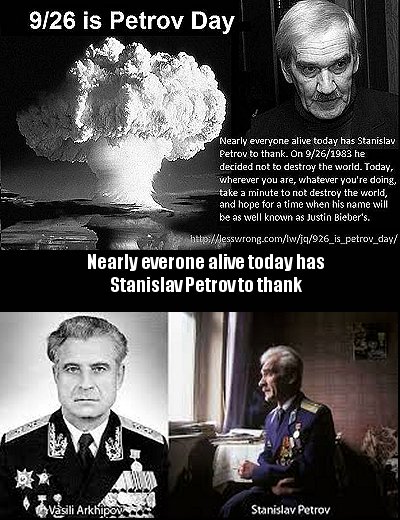
THE DAY THE WORLD SHOULD HAVE ENDED
Stanislav Petrov died in September 2017. Raise a glass to him. You owe him your life.
Think you’re having a hard day at work? Imagine being Stanislav Petrov on September 26, 1983. Petrov was on duty in the early hours of the morning when the Soviet Union’s early warning systems detected an incoming nuclear missile from the United States. He was duty bound to report it, but chose not to, believing it was a false alarm. In the course of the following few minutes, a further four missile launches were detected and Petrov had to make the decision all over again, with much more evidence stacked in favour of a sequential launch.
The protocol for the Soviet military was to respond with a full scale nuclear strike. Petrov knew that if he reported the apparent attack it would lead inevitably to this and then a reciprocal response from the United States. A nuclear war which could have wiped out hundreds of millions of people and precipitated a hellish nuclear winter; a world without the sun’s light and warmth. There were only a few minutes to make his decision before US missiles would hit Moscow and other cities; seconds in which the fate of the world lay in his hands.
Petrov made his choice: the computers must be wrong; it was a false alarm. Satellite radio operators had registered no missiles and Petrov himself had doubts about the reliability of the system. In hindsight it may be easier to rationalise the decision he made, but there was almost overwhelming evidence to the contrary. US-Soviet relations were at a new low in 1983. Earlier in the year, President Reagan had described the Communist regime as an ‘evil empire’; this may have played well to a conservative domestic audience, but the Soviets, misunderstanding his rhetoric, feared he was preparing the ground for a pre-emptive nuclear strike. Earlier in September 1983, a Soviet fighter jet had shot down the South Korean passenger liner, flight KAL 007, as it strayed into Soviet air space, killing all 269 civilians on board and producing an implacable rhetorical response from the US. The Kremlin did not know what would happen next.
The Soviet system was rigid and uncritical. Independent thought was frowned on, following protocols ensured personal safety from punishment. For Petrov himself, it would have been easier to refer the evidence upwards, but he knew the culture was such that no-one would have questioned his report in the critical seconds that lay ahead.
A few unbearable minutes later, his hunch about the false alarm was proven right.
Petrov admitted subsequently that he was not sure the alert was false, thinking the odds were about 50-50. That night he had been a late replacement for a military colleague who had fallen ill. Petrov is sure this man, steeped in Soviet army culture, would have reported the missile launch.
So what kept Petrov from doing the same? There is a sense in which he can’t answer that. A lot rested on his training, which suggested the US would launch an overwhelming pre-emptive strike rather than a short series of only five missiles. Even more rested in the kind of gut decision people sometimes have to make in a crisis. It is hard not to believe the Spirit of God breathed through Petrov that night.
After the collapse of the Soviet Union this story, hushed up for years, became public. Petrov was feted across the world and a compelling film has been made: ‘The Man who Saved the World’ (2015). Yet still most people know nothing of him. His story deserves the widest possible audience. Those who met him invariably shake his hand to say thank you, knowing their own fate – born or unborn – lay in his lap that night.
Stanislav Petrov eschewed the term ‘hero’, saying he was ‘the right person at the right time’. There is something deeply strange about this ageing, irascible, alcoholic Russian once making one of the most important decisions the human world has known, late at night, alone, against the evidence. He is, implausibly, a type of Christ: a man whose actions saved the world, yet about whom most know little. When people get to hear and interpret his story, there is a sense of wonder, awe and personal gratitude. But Petrov only goes so far, having preserved the world as we know it. Jesus’ choice in the dead of night in Gethsemane, to surrender his body to the malice of others, promises a re-created world to come; the very antithesis of the world Petrov saved us all from that fateful night
POPULAR ARTICLES

Obama's Covert Wars
The use of drones is going to change warfare out of all recognition in the next decades.

Through A Glass Starkly
Images of traumatic incidents caught on mobile phone can be put to remarkable effect.

What Are British Values?
Is there a British identity and if so, what has shaped the values and institutions that form it?


